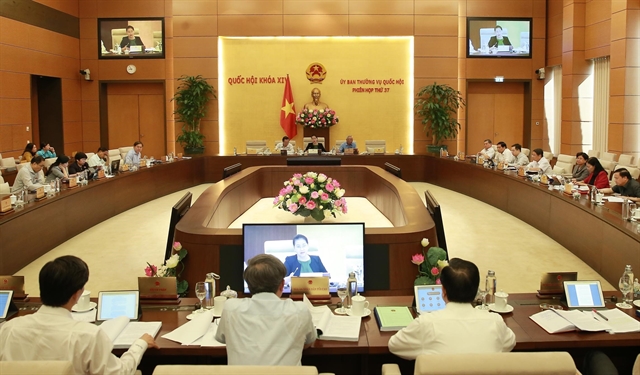 Politics & Law
Politics & Law

The National Assembly Standing Committee didn't think that it should conduct an annual evaluation of all deputies.

|
| The National Assembly Standing Committee convenes on Saturday in Hà Nội to hear reports on and discuss the draft amendments to the Law on Organisation of National Assembly and the draft Law on Mediation and Dialogues at Court. — VNA/VNS Photo Lâm Khánh |
HÀ NỘI — According to draft amendments to the Law on Organisation of National Assembly (NA), the NA Standing Committee will conduct an annual evaluation of all NA deputies and deputy delegations.
However, during the committee’s meeting on Saturday, chair of the NA Judicial Committee Lê Thị Nga and chair of the NA Ombudsman Committee Nguyễn Thanh Hải expressed concerns over the legality of the proposal since no historical precedents or the highest law – the Constitution – grants such power or duty to the committee.
Nga said that since an NA deputy is an elected representative, any review of a deputy’s performance must be based on the assessment of the people.
She also questioned the drafting committee over what types of criteria the NA Standing Committee will use to gauge the performance of NA deputies, while Hải asked the writers to seriously consider the impacts of the regulation.
Another item that divided the committee at the meeting was whether there is a need to increase the ratio of full-time deputies, which currently is stipulated in the law as “at least 35 per cent of the total”.
Many wanted the ratio to be increased to 37-40 per cent or even as high as 50 per cent to reduce the number of deputies who are also working in law enforcement and judicial branches.
Chair of NA Finance and Budget Nguyễn Đức Hải asked that through the activities of his own committee, there is a dire need for full-time deputies, especially highly-skilled ones, and citing international standards where the majority of the deputies work full-time.
However, NA General Secretary Nguyễn Hạnh Phúc, representing the drafting committee, said that this would not be feasible as even now, after human resource preparations and planning, the current ratio in the NA – 167 full-time deputies out of a total of 484, translating to a ratio of 34.5 per cent – still missed the 35 per cent.
The NA Legal Committee also agreed that the stipulation should be kept as is, since the wording allows the ratio to be flexible – allowing the ratio to be increased depending on the situation of each legislature.
Many of the NA Standing Committee noted that while amending the law is necessary, the revisions must be “approaching international practices and norms” and in line with making sure that the principles of equality, collective decision-making and majority rule are respected.
Mediation
Earlier in the morning, the NA Standing Committee discussed the draft law on mediation and dialogues in courts.
Presenting the report on the draft law, Chief Justice Nguyễn Hoà Bình of the Supreme People’s Court stressed that successful mediation and dialogues will help effectively resolve disputes without the need for lengthy and likely expensive legal procedures, while the decisions reached as a result of mediation and dialogues will usually be willingly complied with by the parties involved.
“For the courts, enhancing the effectiveness of mediation and dialogues is one of the core solutions to help alleviate the workloads involved in dealing with disputes that are growing both in number and complexity,” Bình noted.
He said that the pilot model for promoting mediation and dialogues in civil disputes and administrative complaints – carried out in 16 central provinces and municipalities from last November to this September – has seen positive results with the success rate at 74.08 per cent.
NA Chairwoman Nguyễn Thị Kim Ngân agreed that there is a need for the law to govern mediation and dialogue activities.
However, she asked the drafting committee to review the proposed requirements that the mediators must be under 70 years old or have a certificate proving their skills.
She also asked for more clarification on the requirement that the mediator must have “good prestige in the community”.
Regarding the mediation fees, the NA Standing Committee is still split over whether the State budget will shoulder the fees.
Many argued that successful mediation will save time, efforts and expenses for all parties involved so the State should provide support for these activities, but others said in some specific cases, a charge should be imposed to “share the burden” with the State budget.
Chief justice Bình said that the draft law is gearing towards putting the responsibility on the State budget, which will best benefit the people. — VNS




